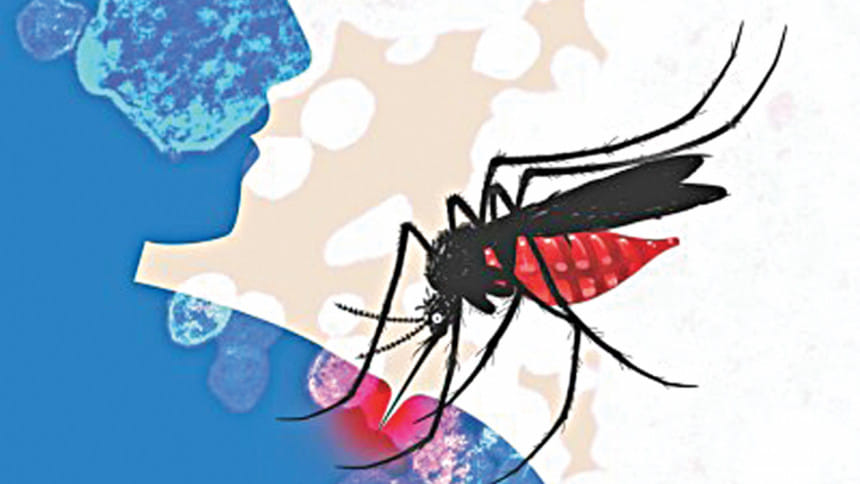Dengue Amid Covid-19 Outbreak: With rain comes risk

When the whole country is fighting to check Covid-19 spread, the current spell of rain may increase the density of Aedes population in the absence of enough anti-mosquito drives in the capital, say experts.
If the authorities fail to take necessary steps to control Aedes mosquitoes, the city may witness a surge in the number of dengue patients and re-emergence of the disease, which would be more dangerous amid this coronavirus outbreak, they add.
Against the backdrop, the government has decided to form a "Dengue Monitoring Cell" to combat the vector-borne disease in the city and the LGRD and cooperatives ministry is going to hold a crucial meeting on this tomorrow.
Since January 1, at least 292 dengue patients were admitted to different hospitals across the country till Sunday, said Aysha Akhtar, an assistant director of Directorate General of Health Services (DGHS).
Sixty-five of the patients were from outside Dhaka.
Last year, 1,01,354 dengue cases were reported; of them, 49,544 were outside Dhaka. The number of deaths from dengue was 179 the same year, she added.
The government announced closure of most of the public and private offices from March 26 to May 5 to slow down the Covid-19 transmission.
Operations of all types of public transport, except the vehicles involved in carrying goods and emergency services, remain suspended. All educational institutions are shut and many people left Dhaka for their home districts.
In this situation, there is a shortage of manpower to clean water bodies and taking other anti-mosquito measures, LGRD Minister Tajul Islam said. "And that's why the activities are not going on in full swing," he told The Daily Star on Sunday.
WHAT EXPERTS SAY
The country, especially Dhaka, has been witnessing rains for the last few days.
If necessary measures are not taken now, this spell of rain will give rise to the density of Aedes population, said Entomologist Kabirul Bashar of Jahangirnagar University.
He also said the construction sites are the most suitable places for Aedes breeding.
"I have visited several construction sites in the city a few days back and found a huge number of mosquito larvae there," he told this newspaper on Sunday.
As there is no activity in the construction sites and many government structures and private houses are empty due to ongoing shutdown, there is huge chance of rise in Aedes population after rains, he said.
Train stations and bus terminals are also suitable places for mosquito breeding as the operations of buses and trains remain suspended, he said.
According to the latest survey of the Communicable Disease Control Division of DGHS, flooded basements, plastic barrels and water tanks at construction sites are the prime breeding grounds for Aedes mosquitoes.
Among the breeding sources, flooded floor basements account for 11.69 percent Aedes breeding, plastic drums 22.08 percent, plastic buckets 10.39 percent, water tanks 9.09 percent, holes for water metre 9.09 percent, elevator shafts 5.19 percent, mineral water jars 3.90 percent, clay pots 2.60 percent, paint pots 2.60 percent and the rest 15.58 percent, according to the study conducted last month.
Kabirul Bashar suggested taking necessary steps to destroy the breeding sources immediately.
Besides cleaning activities, awareness campaigns should be launched across the country and the Local Government Division will have to take necessary steps to train upazila-level local representatives on proper anti-mosquito drives.
Monzur Chowdhury, another entomologist and former president of Zoological Society of Bangladesh, said the current spell of rain will reduce Culex population but at the same time it will increase Aedes mosquitos.
He suggested conducting anti-mosquito drives in around 50m radius of a house of a dengue patient after collecting his or her address from hospital.
Monzur also recommended carrying out a survey after the rain in and outside the city where number of dengue cases was high last year.
PREPARATIONS
The Public Administration Ministry on Sunday wrote to all other ministries and divisions to send names of their representatives for the Dengue Monitoring Cell within three days.
The ministry issued the letter following a meeting on Dengue issue on April 23 presided over by the chief coordinator on SDG affairs of the Prime Minister's Office (PMO).
The committee will monitor awareness campaigns and destruction of Aedes breeding grounds under the two city corporations like previous year, the letter said.
Meanwhile, LGRD Minister Tajul Islam said they will hold a meeting tomorrow to discuss the plan and progress of combating Aedes mosquitoes and cleaning water bodies in the city.
Due to the shutdown, he said, there is a shortage of manpower for cleaning water bodies and taking other anti-mosquito measures. "We will discuss how all the activities relating to dengue can be sped up," he added.
Representatives of all stakeholders including Dhaka North and South city corporations, Wasa, Desa and Rajuk are expected to join the meeting.
WHAT CITY CORPORATIONS SAY
Talking to The Daily Star recently, Brig Gen Mominur Rahman Mamun, chief health officer of Dhaka North City Corporation, claimed they were applying larvicidal and adulticidal every day.
He said the LGRD minister in a recent meeting directed all stakeholders to take necessary steps to destroy the breeding grounds. "We have issued letters to them recently, so that they address this properly."
Mamun said they also applied larvicide and adulticide at construction sites but it was not possible for their spray men to do the job properly as many places were inaccessible.
So, it is the duty of the owners of the building or the construction authorities to take necessary steps in this regard, he added.
Chief Health Officer of DSCC Brig Gen Sharif Ahmed recently said they are also spraying adulticide and larvicide twice a day. In addition, they are also applying antiseptic through water browsers.
He said they are focusing on construction sites so that Aedes mosquitoes do not breed there.


 For all latest news, follow The Daily Star's Google News channel.
For all latest news, follow The Daily Star's Google News channel. 



Comments